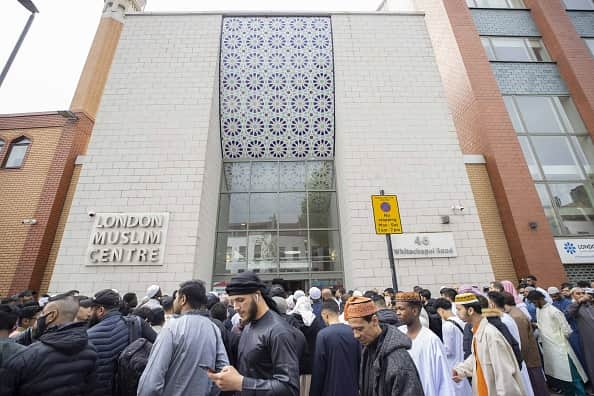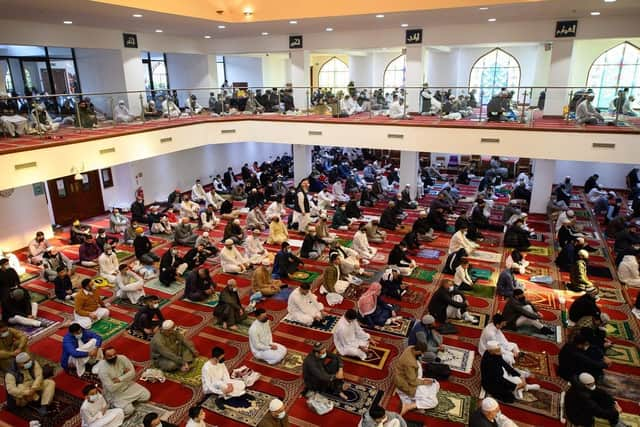Eid al-Fitr 2024: When is the moon sighting, is tomorrow Eid in the UK, how do you wish happy Eid
and live on Freeview channel 276
As Ramadan comes to an end, Muslims throughout the world excitedly await news of the sighting of the new moon this week, which marks the end of the holy month and the beginning of Eid al-Fitr, a celebration centred around a large feast.
In many parts of the world, dedicated moon-sighting teams combed the sky with telescopes and binoculars in search of the elusive crescent moon. The coming of Eid al-Fitr in the month of Shawwal, the tenth month in the Islamic calendar, marks the end of the fasting month.
Advertisement
Hide AdAdvertisement
Hide AdLike Ramadan and other Muslim celebrations, the time of Muslim months and holidays is largely determined by the lunar cycle, particularly the sighting of the Moon's crescent after the new Moon. And because the visibility of the new Moon is dependent on clear sky and other variables, it is impossible to predict the exact date of Muslim holidays with accuracy or too far in advance.
According to Timeanddate.com, the holiday might also occur on multiple dates depending on a country's longitude and time zone. Therefore, depending on their country of origin, religious orientation, or cultural association, some Muslims may observe the festival one day sooner than others. So, when will Eid al-Fitr be celebrated in the UK? Here's everything you should know.


When is Eid al-Fitr in the UK 2024
In many parts of the UK, Ramadan 2024 began on March 11, as determined by the lunar calendar. The end of the fasting month is signalled by the sighting of the next crescent moon, which occurs between the 29th and 30th day of the holy month.
Scholars will search for the moon on the 29th of the month, which is Monday (April 8) for those who began fasting on March 11, and Tuesday (April 9) for those who began Ramadan a day later.
Advertisement
Hide AdAdvertisement
Hide AdBritish astronomers working for the UK’s HM Nautical Almanack Office, a government organisation that provides statistics to the police, military services, diary manufacturers, and others, forecast the possibility of sighting the moon based to the visibility of the crescent moon in the UK, Saudi Arabia, and Morocco to forecast the exact day of Eid al-Fitr.
According to them, the new moon will be visible in most places on the evening of Tuesday (April 9) therefore Eid will likely begin on Wednesday, (April 10)


What is Eid al-Fitr?
Eid al-Fitr is derived from an Arabic phrase that means "feast of breaking the fast". While it is not a common public holiday in the UK, it is for many Muslim nations. The festivities start with morning prayers, which are typically held at a mosque. Eid features a unique prayer that is meant to be recited in congregation.
Muslims typically congregate in parks for large-scale celebrations after the prayers. Some Muslims choose to fast for the six days that come after Eid. This is due to the Islamic notion that good conduct in Islam is rewarded 10 times, therefore fasting for six days during Shawwal and 30 days during Ramadan generates goodwill equivalent to a year.
Advertisement
Hide AdAdvertisement
Hide AdEid al-Adha, the second Eid celebration in the Islamic calendar, takes place later in the year. Literally meaning "feast of the sacrifice," it is regarded as the more sacred of the two Eids. It celebrates the account of Prophet Ibrahim, also known as Abraham in the Old Testament, sacrificing his son in accordance with God's mandate.
Depending on the country, the celebrations of Eid al-Adha can last anywhere between two and four days. The act of sacrifice (Qurbani) is carried out following the Eid prayers, which are performed in congregation at a mosque on the morning of Eid.
The act of sacrifice consists of slaughtering an animal as a sacrifice to mark this occasion in remembrance of Prophet Ibrahim’s sacrifice for God.
How do you wish for a Happy Eid?
It is customary to say "Eid Mubarak" during both Eid al-Fitr and Eid al-Adha celebrations. "Eid Mubarak" means "blessed celebration" or "blessed feast" because the Arabic word "mubarak" translates as "blessed," and the word "Eid" implies feast, festival, or celebration.
Advertisement
Hide AdAdvertisement
Hide AdHowever, it is typically understood to mean only "Happy Eid" wishes. While "Eid Mubarak" is more than sufficient, you can also say "Eid al-Fitr Mubarak" or "Eid al-Adha Mubarak" to distinguish between the two holidays.
Comment Guidelines
National World encourages reader discussion on our stories. User feedback, insights and back-and-forth exchanges add a rich layer of context to reporting. Please review our Community Guidelines before commenting.
